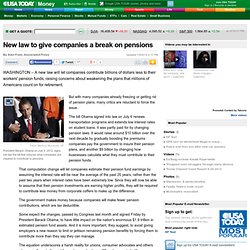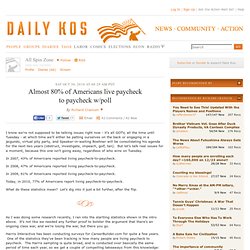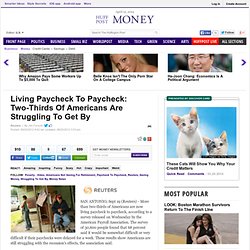

Why Gen Y may face least secure retirement. Think of retirement as a family dinner table.

It's an heirloom that is meant to weather the years, and a central fixture in the lives of each relative. On the whole, grandparents, or Baby Boomers, had it pretty good. The table's four legs were sturdy: a job, a home, Social Security, and a pension. But Generation X essentially experienced a house fire. They were the first to see their pension leg replaced by 401(k) plans, which were widely adopted in the 1980s. Meant as an alternative to pensions paid by employers, 401(k)s are funds based on worker contributions that put the investment risk, and control, in employees hands. 3 Legged Stool Plan. 3 Legged Stool FAIL. Social Security Fund to Run Out in 2035, Trustees Say. The budget outlook for Social Security is getting dimmer, the U.S. government said, with its primary trust fund now projected to run dry three years sooner than anticipated.

The fund that helps finance benefits for 44 million senior citizens and survivors of deceased workers will be exhausted by 2035, the program’s trustees said in an annual report yesterday. Aid would have to be cut at that point if Congress doesn’t intervene. Social Security’s disability program, which helps support 11 million Americans, will run through its trust fund in 2016, two years earlier than predicted.
The report attributed the fiscal stress in part to the weak economy. The main trust fund that supports the Medicare health-care program for the elderly will run out of money in 2024, the report said. Trustees report Social Security outlook worsening. WASHINGTON – The Medicare and Social Security trust funds are both on "unsustainable paths" — as they have been for years — and will be exhausted by 2024 and 2033, respectively, a trustee report released Monday said.

"The projections in this year's report are somewhat more pessimistic than last year's report," Treasury Secretary Timothy Geithner said. The 2024 date for depletion of the Medicare trust fund was the same as predicted last year, while trustees moved up the date for the Social Security fund running out by three years compared with last year. STORY: Government says Medicare will save $200B through 2016 Geithner said the 2010 health care law would lower costs by changing how people pay for health care. News About Social Security Trust Fund Shortfall Only Gets Worse. Broken Promises: Pensions All Over America Are Being Savagely Cut Or Are Vanishing Completely.
How would you feel if you worked for a state or local government for 20 or 30 years only to have your pension slashed dramatically or taken away entirely?

Well, this exact scenario is playing out from coast to coast and in the years ahead millions of elderly Americans are going to be affected by broken promises and vanishing pensions. In the old days, things were much different. You would get hired by a big company or a government institution and you knew that the retirement benefits that they were promising you would be there when you retired in a few decades. Unfortunately, we have now arrived at a time when government institutions and big companies have promised far more than they are able to deliver, and "pension reform" has become one of the hot button issues all over the nation. Has Your Retirement Been Stolen? New law to give companies a break on pensions. WASHINGTON – A new law will let companies contribute billions of dollars less to their workers' pension funds, raising concerns about weakening the plans that millions of Americans count on for retirement.

But with many companies already freezing or getting rid of pension plans, many critics are reluctant to force the issue. The bill Obama signed into law on July 6 renews transportation programs and extends low interest rates on student loans. It was partly paid for by changing pension laws. It would raise around $10 billion over the next decade by gradually boosting the premiums companies pay the government to insure their pension plans, and another $9 billion by changing how businesses calculate what they must contribute to their pension funds. That computation change will let companies estimate their pension fund earnings by assuming the interest rate will be near the average of the past 25 years, rather than the past two years when interest rates have been extremely low. Almost 80% of Americans live paycheck to paycheck w/poll. I know we're not supposed to be talking issues right now - it's all GOTV, all the time until Tuesday - at which time we'll either be patting ourselves on the back or engaging in a jaigundo, virtual pity party, and Speaker-in-waiting Boehner will be consolidating his agenda for the next two years (obstruct, investigate, impeach, golf, tan).

But let's talk real issues for a moment, because this one isn't going away, regardless of who wins on Tuesday. In 2007, 43% of Americans reported living paycheck-to-paycheck. Living Paycheck To Paycheck: Two-Thirds Of Americans Are Struggling To Get By. SAN ANTONIO, Sept 19 (Reuters) - More than two-thirds of Americans are now living paycheck to paycheck, according to a survey released on Wednesday by the American Payroll Association.

The survey of 30,600 people found that 68 percent said it would be somewhat difficult or very difficult if their paychecks were delayed for a week. These results show Americans are still struggling with the recession's effects, the association said. "This study clearly shows that Americans are finding it hard to save," said Dan Maddux, executive director of the San Antonio-based association of payroll managers. In 2006, 65 percent of respondents reported living paycheck to paycheck, a figure that shot up to 72 percent in 2010 in the wake of the recession. The survey was released during a week when a video of Republican Mitt Romney sparked a national conversation about the 47 percent of Americans who, Romney told donors, don't pay income taxes and are dependent on government.
"Cable used to be a luxury. Can't save for your own retirement. Dear America: It's time to up our entrepreneurial game. By Scott Gerber FORTUNE -- As millions of college students graduate straight into the unemployment line this year (two out of three carrying student loan debt, at an average of $26,000) educators, employers and politicians need to ask one themselves one question: How much longer are we going to tell this generation that "good" jobs will simply reappear?
